Hamas-Israel war and India
By Philip Mudartha
Bellevision Media Network
17 Oct 2023: The Hamas cross-border terrorist attack on Israel in the early hours of Saturday, the 7th October was unprecedented. Over 5,000 rockets were fired at Israeli cities, and villages. Under the cover of rocket fire, over 2,500 armed men poured into Southern Israel using either para-gliders or SUVs, trucks and motor-cycles. They went on a killing rampage of unarmed civilians who were either dancing at a Supernova desert music festival or sleeping in their homes. Women, babies and elderly were not spared. They bombed police stations and over-ran security guard-houses before the army re-enforcements arrived. The surprise multi-pronged attacks left the State of Israel in utter confusion, sorrow and anger. Its reputation of world-class intelligence gathering spy-networks, technological superiority, military might and defence preparedness was in tatters.

A Hamas fighter at the Supernova music festival on 7th October.
In pursuit of its stated policy of vengeance, the State of Israel went to war against Hamas in the besieged territory of Gaza. Aerial bombardment began on 7th October itself. Supplies from Israel of electricity, fuel, water, food, medicines and other goods of civilian uses were stopped.
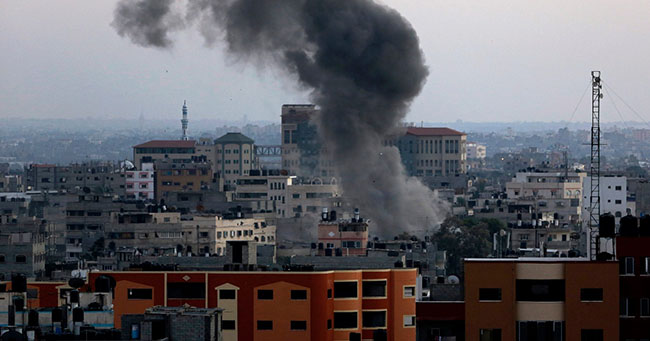
Israel hits back at Gaza City
Our PM Narendra Modi, was among the first world leaders to condemn Hamas for its barbaric actions. His reaction was appropriate, sharp, clear and to the point without any ambiguity about where India stands. “We stand in solidarity with Israel at this difficult hour,” he tweeted, “Our thoughts and prayers are with the innocent victims and their families.” Then he spoke to Israeli PM Benjamin Netanyahu, one of the world leaders he counts as his personal chum, and added: “India strongly and unequivocally condemns terrorism in all its forms and manifestations.”
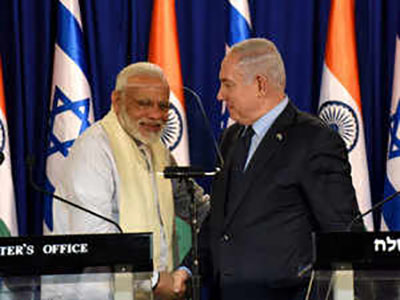
PM Modi with Israeli PM Netanyahu
However, ten days into the war, he has not expressed any concern about the dire plight of the Palestinian Civilians trapped in Gaza. None of his statements have alluded to the innocent and hapless people in Gaza.
Under Modi, India has “tilted” towards Israel. In July 2017, he visited Tel Aviv.
Breaking with the protocol established through most visits by world leaders to Israel, Modi did not go to Ramallah, where the Palestinian Authority is seated. Netanyahu reciprocated the visit in January 2018. The very public increase in ties under Modi stood in contrast with the more discreet approach that earlier governments adopted towards Israel.
Foreign policy under Modi is guided by ruthless pragmatism rather than romantic idealism. India perceives the shifting political and economic landscape in the Middle East as an opportunity to deepen ties with Israel. If UAE and Bahrain can normalize ties with Israel under Abraham Accords by sidestepping the Palestinian Cause, why should India not do likewise?
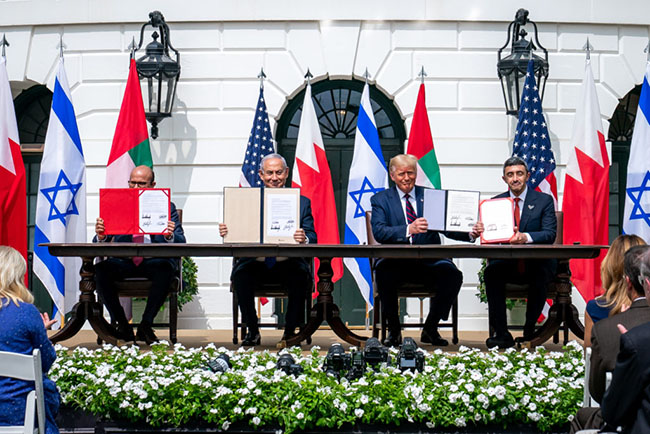
Abraham Accords (UAE, Bahrain, Israel) brokered by US President Trump
On 29th November 1947, the United Nations General Assembly passed resolution 181 (II) which recommended establishing the State of Israel alongside a State of Palestine by the partition of British Palestine. The former was for Jews and the latter for Arabs. India was a newly independent nation with an interim national government led by PM Nehru. Nehru, Mahatma Gandhi, and other Indian nationalists were sympathetic to the Jewish cause. But, they opposed the partition of British Palestine and advocated for a Federation in Palestine with guarantees for Jewish religious minority. This stand was probably the result of experiencing the horrors of Partition of British India into Pakistan for Muslims and India. Thus, India voted against the UN Resolution 181(II). Even former colonial power, Great Britain chose to be neutral and abstained. The Arabs rejected the partition plan and went to war against the newly formed State of Israel.
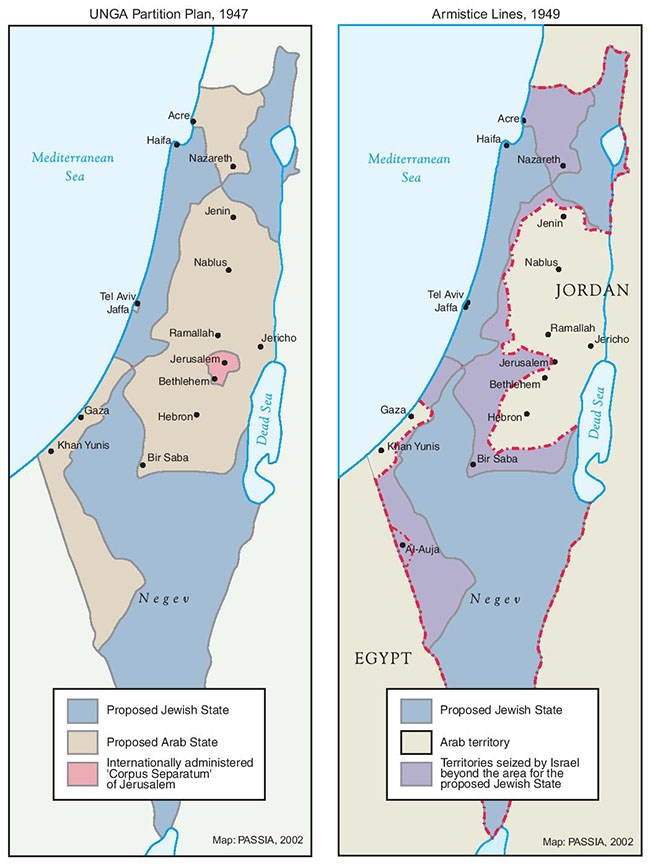
Partition of British Palestine by UN Resolution 181
India formally recognized the State of Israel on 17th September 1950. Israel opened a consulate in Bombay in 1953. For much of the Cold War, Indo-Israeli contacts were limited. New Delhi wanted to avoid alienating the Arab world and sought to appease the Muslim population at home. In January 1992, India established full diplomatic relations with Israel. India opened its embassy in Tel Aviv. Israel opened its embassy in New Delhi. With the dissolution of Soviet Union, the Cold War ended and a new world order took shape. Palestinians sought rapprochement with Israel and signed the Oslo Accords. There was no reason for India to pursue its policy of ignoring Israel.
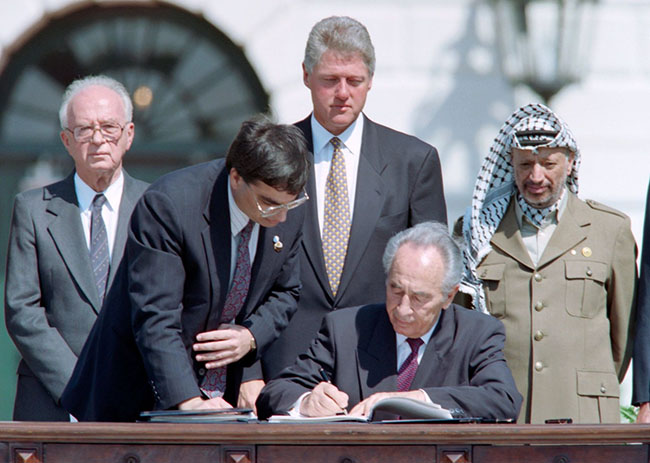
Land for Peace, signing of Oslo Accords 1993
Until 1992, India’s foreign policy goals were different than what they are today. For decades, India followed the non-aligned policy. As co-founder of non-aligned movement, it stood for the rights of the oppressed anywhere in the world. Its pro-Arab policy was due to its strategic interests, mainly dependence on crude oil supplies from Middle East, presence of large expatriate workforce in the Gulf Arab countries, and the need to counter the Pakistani influence among Arabs. India’s pro-Soviet tilt in response to the pro-Pak tilt of the US was another reason for our diplomatic behaviour.
Ties between the two nations have flourished since 1992, primarily due to common strategic interests and security threats. In 1999, Israel supported India in the Kargil War. Today, Israel is the second largest supplier of our defence needs after Russia. At the diplomatic level, both the countries have maintained healthy relations despite India’s repeated condemnations of Israeli military actions in Palestinian territories.
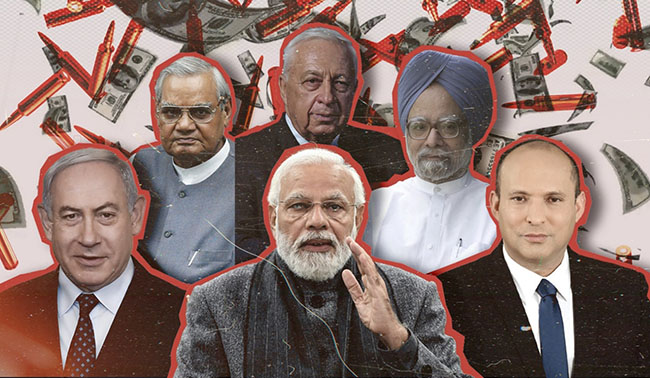
30 years of Israel and India strategic relationship
India and Israel have increased co-operation in military and intelligence ventures since the establishment of diplomatic relations. The rise of Islamic extremist terrorism in both nations has generated a strong strategic alliance between the two. Indian public opinion has also shifted in favour of Israel, especially after repeated attacks on Indian soil from Pak-based terrorists. The 26/11 Mumbai terror attacks on civilians is considered akin to the 7/10 Horror that the Hamas unleashed on civilians in Southern Israel.
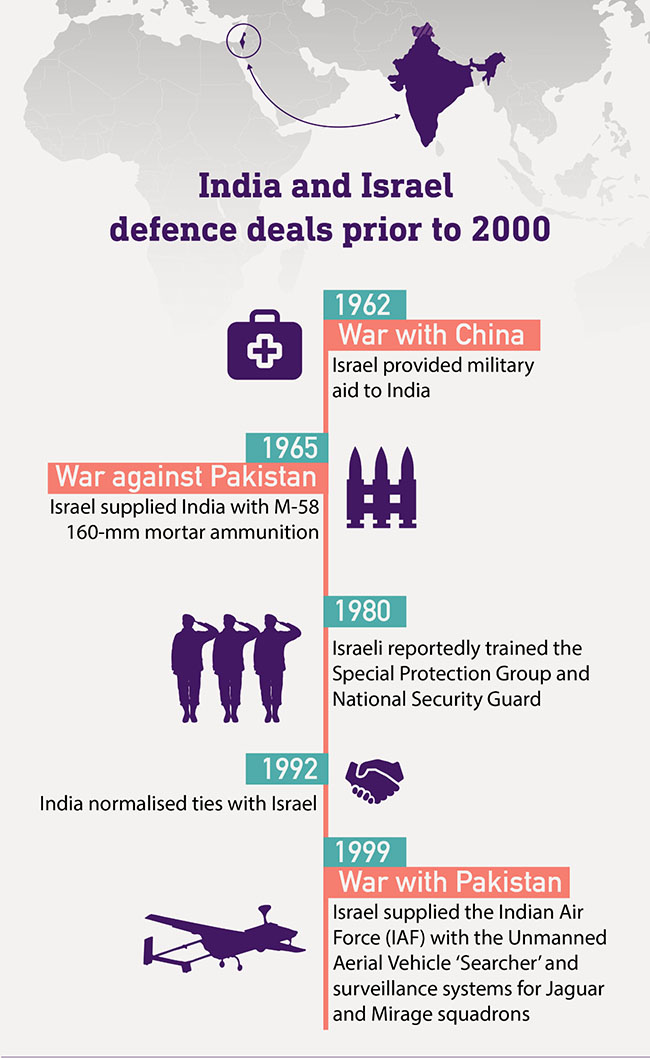
Israel military assistance to India since 1962
The next chapter will begin with Albert Einstein’s attempt to convince his close friend Jawaharlal Nehru to vote for the UN Resolution 181which established the State of Israel.
(To be continued)
| Comments on this Article | |
| Ronald Sabi, Moodubelle | Wed, November-1-2023, 11:22 |
| Real time article. It helps us understand current scenario and background with unbiased facts and figures. Looking at Israeli military assistance to India over the decades, it is natural India rightly condemned unprovoked attack on its friend. Sadly Hamas culminated carnage on attackers territory, innocent civilian s were at the receiving end. General understanding is for the sake of peace and growth co-existence is the best policy. Now conflict and hatred bigots the same in return mutually. Hope peace prevails in this ME region. Eagerly waiting to read related articled just published. Thank you Philip for compiling such an informative collections and pictures / tables. | |
| roji mathew, Qatar | Mon, October-23-2023, 5:49 |
| J and K is an integral part of Israels long term strategy with india due to its proximity with Iran and pakistan and it is crucial for their safety.It is definitely and advantage to both parties. | |
| roji mathew, Qatar | Sun, October-22-2023, 5:53 |
| The historical relationship between the Malabar Coast and Jews dates back to ancient times, well before the birth of Jesus. Jewish communities settled along the western coast of India, coexisted with the local population for centuries.Baghdadi Jews did play a role in the economic development of Bombay.The rise of Zionism as a political movement in the late 19th centuries did indeed impact diplomatic relations and the global political landscape. India has historically maintained a pragmatic foreign policy that aligns with its national interests and changing global economic dynamics. After liberalization in 1992, India pursued a more open and market-oriented economic policy. In parallel, India also recognized the importance of developing diplomatic relations with various countries, including Israel, which had become a significant player in the global economy and technology sector. India s foreign policy decisions are typically influenced by its national interests, security concerns, and public sentiment. The country s evolving relationship with Israel is a reflection of these considerations, as well as its broader foreign policy goals | |
| Nandanan, Thrissur | Thu, October-19-2023, 11:23 |
| I believe that India’s stand on the issue is firm and clear. Never be soft when it comes to terrorism. Say NO to terrorism, and while saying so do it firmly and clearly. India was always on receiving end. It changed just recently only. Remember 26/11.. You and me were just lucky not to be there at VT station on that day. Else we both wouldn’t be here to write and read this article. Criticism on India’s stand on the issue is just political, to win few votes. It is disappointing…. | |
| Michael Sequeira, PAMBOOR/NAIROBI | Thu, October-19-2023, 11:09 |
| very clear understanding of the geo-political scenerio in the region. We pray for a peaceful treaty to end this massacre of innocent civilians. continue enlightening us on the issues. | |
| Nandanan, Thrissur | Thu, October-19-2023, 10:27 |
| Nice one. Even Egypt has now ties with Israel. India’s position with Palestinian, during any regime at centre, was hypothetical. It enormously shed sympathies. India’s relations with Israel, like the rest of the world except very few, was materialistic. | |




 Write Comment
Write Comment E-Mail To a Friend
E-Mail To a Friend Facebook
Facebook Twitter
Twitter  Print
Print 














